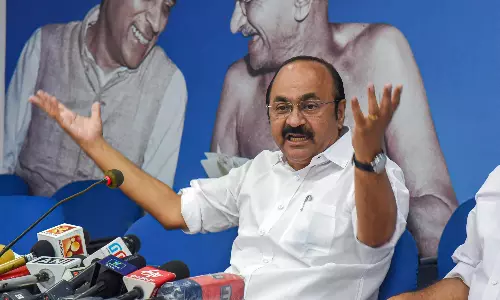
Pakistan harbours terrorists, cynically raises Kashmir at UN: India
text_fieldsUnited Nations: In a sharp rebuke to Pakistan for raising the Kashmir issue at the UN, India has denounced it as a country that uses terrorists and provides them sanctuary and said Islamabad's cynical efforts to internationalise the dispute has fallen flat.
Calling its reference to Kashmir an "attempt at misuse" of the UN platform, India's Permanent Representative Syed Akbaruddin said on Thursday, "The attempt came from Pakistan, a country that covets the territory of others; a country that uses terrorism as state policy towards that misguided end; a country that extols the virtues of terrorists and that provides sanctuary to UN-designated terrorists; and a country that masquerades its efforts as support for human rights and self-determination."
Earlier at a high-level UN General Assembly (UNGA) debate on "Human Rights at the Centre of the Global Agenda", Pakistan's Permanent Representative Maleeha Lodhi accused India of human rights violations in Kashmir and of carrying out an "extra-judicial killing of a person" she described as a "Kashmiri leader".
It was a reference to Burhan Wani, the 22-year-old Hizbul Mujahideen commander, who was killed on July 8 in a gunfight. The violence in the state following his death has killed 37 people so far.
Lodhi said Indian forces were resorting to "brutal acts to suppress the right to self-determination of the people of Kashmir".
Akbaruddin drew attention to Islamabad's defeat last December in its re-election bid for the Human Rights Council as a sign of the loss of its credibility.
"Pakistan is the same country whose track record has failed to convince the international community to gain membership of the Human Rights Council in this very session of the UNGA."
"The international community has long seen through such designs," he said, adding: "Cynical attempts, like the one this morning, therefore, find no resonance in this forum or elsewhere in the UN."
Even as she attacked India, Lodhi struck contradictory notes asserting that "human rights cannot be guaranteed in situations of turmoil and conflict" and that the "human rights agenda needs to be depoliticised".
"Tabling of country specific resolutions without the consent of the countries has proven to be counter-productive," she added.
Separately, Secretary General Ban Ki-moon's spokesperson Stephane Dujarric reiterated Ban's call "to both sides to exercise restraint".
Briefing reporters earlier Thursday, Dujarric said that Ban was closely following the situation in Kashmir and "regrets the loss of lives".
While Ban was ready to use his "good offices" to facilitate India and Pakistan resolving the situation, it could be only at the request of both sides, he added.
In his speech, Akbaruddin criticised "the politicisation and select targeting of countries" on human rights issues.
"An aggressive 'naming and shaming' exercise has its limits, is often counter-productive and tends to divide member states into opposing camps."
"A more constructive and non-confrontational approach that is sensitive to the genuine concerns and capacity constraints of countries" would help countries improve their human rights records, he added.






















